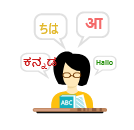Ever wondered how the IELTS band score is calculated? As we know IELTS has a nine-band scale to identify, levels of proficiency, half scores such as 7.5 are also possible. This following article will clear all your queries regarding IELTS Band Score and Marking Criteria.
IELTS BAND SCORE
If you are taking IELTS for immigration, good IELTS score will depend on the kind of visa that you require - work, business, for investors, for students, etc. If you’re taking IELTS for studying abroad, a good IELTS score will vary according to the country and the institution you are applying for.The British Council’s official descriptions of the different bands are as follows:
IELTS BAND SCORE |
SKILL LEVEL |
|
9 |
EXPERT |
|
8 |
VERY GOOD |
|
7 |
GOOD |
|
6 |
COMPETENT |
|
5 |
MODEST |
|
4 |
LIMITED |
|
3 |
EXTREMELY LIMITED |
|
2 |
INTERMITTENT |
|
1 |
NON-USER |
IELTS Test Marking Criteria
IELTS papers are checked at British Council & IDP Australia. They have highly qualified and certified team of IELTS examiners and evaluators. Writing and speaking components of the IELTS test are corrected by human examiners at British Council. The listening and reading components of the IELTS test are marked by the computer and later checked by the human examiner for quality. So make sure your handwriting is neat and precise enough for the examiners to read.
Marking criteria for IELTS Listening and Reading test
IELTS listening and reading tests both contain 40 questions. Each correct answer is awarded one mark. The total score out of 40 is then converted to whole or half band score. There is no negative marking for wrong answers.
Raw Score & Band Score
| RAW SCORE | BAND SCORE |
|---|---|
| 39-40 | 9 |
| 37-38 | 8.5 |
| 35-36 | 8 |
| 32-34 | 7.5 |
| 30-31 | 7 |
| 26-29 | 6.5 |
| 23-25 | 6 |
| 18-22 | 5.5 |
| 16-17 | 5 |
IELTS Academic Reading Score
| RAW SCORE | BAND SCORE |
|---|---|
| 39-40 | 9 |
| 37-38 | 8.5 |
| 35-36 | 8 |
| 32-34 | 7.5 |
| 30-32 | 7 |
| 27-29 | 6.5 |
| 23-26 | 6 |
| 19-22 | 5.5 |
| 15-18 | 4 |
| 13-14 | 4.5 |
| 10-12 | 3 |
IELTS General Training Reading Scores
|
RAW SCORE |
BAND SCORE |
|
40 |
9 |
|
39 |
8.5 |
|
37-38 |
8 |
|
36 |
7.5 |
|
34-35 |
7 |
|
32-33 |
6.5 |
|
30-31 |
6 |
|
27-29 |
5.5 |
|
23-26 |
5 |
|
19-22 |
4.5 |
|
15-18 |
4 |
|
12-14 |
3.5 |
|
9-11 |
3 |
|
6-8 |
2.5 |
Marking criteria for IELTS speaking test
The examiner listens to the candidate then evaluates their level by comparing the candidates’ performance. The test says what a speaker can do in four areas. Levels go from 1 - 9. The four criteria are described below:
- Fluency and Coherence -- This refers to how good the candidate is in talking at the right speed and how good they are at connecting their ideas.
-
Lexical Resource -- This refers to how much vocabulary the candidate has and how well they use it.
-
Grammatical Range and Accuracy -- This refers to how many structures the candidate has and how well they use them.
-
Pronunciation -- This refers to how well the candidate pronounces the language.
Marking criteria for IELTS Writing test
Task 1 and Task 2 writing will be marked separately by two different IELTS examiners based on four criteria:
-
Task Achievement (Task 1) / Task Response (Task 2) -- This refers to opinion and ideas.
-
Coherence and Cohesion -- This refers to organization and linking.
-
Lexical Resource - This refers to vocabulary and spelling.
-
Grammatical Range and Accuracy -- This refers to grammar and punctuation.
Tips to Get Highest Score in IELTS Exam
-
Take two complete listening and reading exams per week. Concentrate on the listening test as you only hear it once.
-
Write down all your answers on your question paper while the recording is playing. Make use of shorthand and abbreviations to make it quicker and make sure that you can read your handwriting as you are given only 10 minutes at the end of the test to transfer your answers to your answer paper. Make sure your writing on your answer sheet is neat and precise.
-
If you don’t write anything, there is a 100% chance of scoring zero. So never leave an answer blank during writing test. If you write something, it might be correct. Make an educated guess. Underline the essential words in each paragraph before you answer the questions.
-
Make a list of useful vocabulary about topics like health, environment, education or technology for writing and speaking sections. Train and record yourself to check your mistakes. Try to use these new words in daily situations too.
-
Write at least three paragraphs- introduction, body and conclusion. Make sure you plan and write notes. Connect the points in the essay, make sure they are relevant to your argument and explain them or support them with examples. Don’t write less than 250 words. Try using appropriate idioms and expressions in your writing.
-
Maintain eye contact with the Examiner during speaking test. Do not be nervous and be as confident as possible. In the one-minute preparation time in part 2, think about what you are going to say and make a few points. Try to speak about all the points on the card in part 2. Get used to IELTS speaking style.



